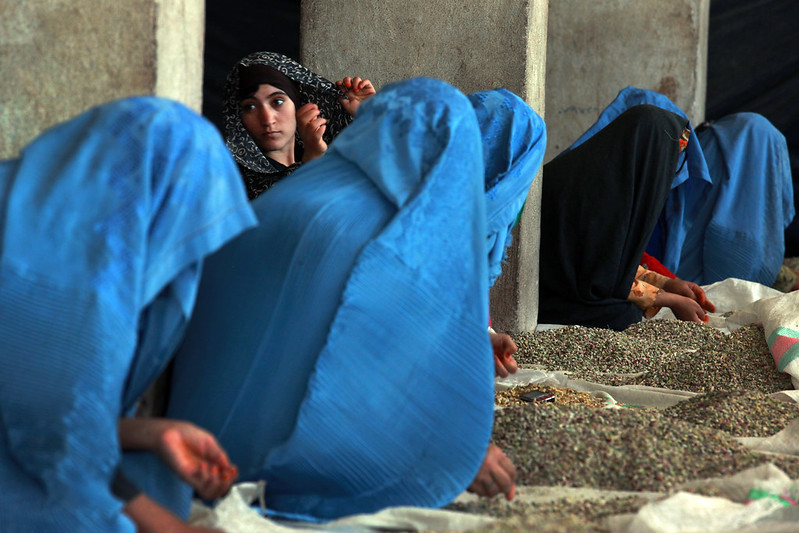Zan Times: A Platform for Afghan Women’s Voices

The foundation of the journalistic outlet Zan Times stands on a specific objective: Giving Afghan women their voices back through a new media platform. This recently released platform covers the human rights situation in Afghanistan through “a women’s-led newsroom” as one of its main focuses is women’s rights. On October 20, 2022, Zahra Nader introduced herself as the editor-in-chief of Zan Times and spoke at the U.N. to discuss the struggle Afghan women and girls face every day under the new Taliban rule. She also highlighted “why women’s representation—in peacebuilding, in journalism and everywhere else—matters,” U.N. Women reported.
Since the occupation of Afghanistan by the Taliban in 2021, the situation for women and girls in the country has deteriorated, leading to more inequality and poverty. In a May 2022 statement, Sima Bahous, the U.N. Women executive director, said, “Current restrictions on women’s employment have been estimated to result in an immediate economic loss of up to $1[billion] – or up to 5% of Afghanistan’s GDP.”
The Background
Kabul, Afghanistan’s capital city, fell to the reign of the Taliban on August 15, 2021. The new regime has led to a regression in “[women’s] rights, their condition and their social and political status” due to restrictions on women’s mobility, access to education, employment and other economic resources and rights, according to a press briefing by Alison Davidian, country representative a.i. for U.N. Women in Afghanistan.
“Before 15 August 2021, 17% of women participated in the labor force nationwide; this decreased by 16% by the end of October 2021,” U.N. Women reported.
The exclusion of women from areas of life such as education and employment harms a country’s economic development. Over the past five decades, rising levels of educational attainment have stood as a driving factor behind the economic expansion of OECD countries. Furthermore, “women’s economic empowerment boosts productivity [and] increases economic diversification [as well as] income equality,” according to U.N. Women.
Zahra Nader
Zahra Nader is an Afghan-Canadian journalist and editor-in-chief of the Zan Times. After starting her journalistic career in 2011 in Kabul, she moved to Canada six years later to pursue higher education and is now studying toward a doctoral degree in feminist studies.
“Today, an estimated 20 million women and girls who grew up in Afghanistan going to school, to work, who grew up being able to go where they liked and to speak their minds, are, under the Taliban, deprived of these fundamental human rights because of their gender. Women have been ordered to stay home. Girls have been banned from attending school above sixth grade,” said Nader in October 2022 at the United Nations Security Council Open Debate on Women, Peace and Security.
A New Hope
Zan Times is a media platform that aims to provide a different view on human rights violations by focusing on the perspective of those resisting rather than those committing the violations and collecting the work of journalists, writers and activists. Apart from Afghan women, the Zan Times also focuses on other marginalized groups, such as sexual minorities and particular ethnic groups. By documenting the experiences of these individuals, Zan Times ensures the world hears the voices of the marginalized.
For instance, the platform’s reporters write about the experience and commentary of female activists resisting the Taliban regime. In August 2022, the reporters had the opportunity to interview Robaba (the pseudonym that the interviewee uses), who, before the return of the Taliban, worked as the “editor-in-chief of a newspaper and owned an art gallery in Balkh province.” She shared her experience opposing the new restrictive government.
This approach allows readers from everywhere in the world to identify and understand the struggle while also giving voice to those who the Taliban silenced. Zan Times also allows activists to share their initiatives to raise awareness of current events in Afghanistan. For example, Zan Times interviewed British-Iranian producer Ramita Navai who recently released Afghanistan Undercover, a documentary showing an undercover investigation into the Taliban’s repression of women in Afghanistan.
Looking Ahead
Giving Afghan women a platform to voice their experiences is a powerful initiative. Girls and women in Afghanistan are currently facing a difficult reality. Even though the future of Afghanistan is uncertain, the work of Nader and other reporters dedicated to raising awareness and offering opportunities for women to speak their truth provides hope to Afghan women.
– Caterina Rossi
Photo: Flickr
